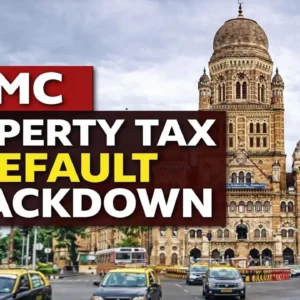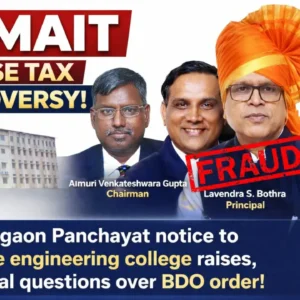How Deep Does the Lodha Fraud Go?
• Forensic Audit Reveals Suspicious ₹49 Crore Transfer to Son’s Account
• Witness Statements Detail a Decade-Long Pattern of Cash Transactions
• From Boardroom to Jail: The Corporate Governance Failure at Lodha Developers
The Mumbai Police Crime Branch has arrested Rajendra Lodha, former director of Lodha Developers Ltd. (now Macrotech Developers), in a fraud probe involving unauthorized land sales, TDR manipulation, and a suspected hawala network. A forensic audit uncovered a suspicious ₹49 crore transfer to his son’s account and witness statements outlining a decade-long pattern of cash transactions. In an exclusive investigation, Sprouts News uncovers the intricate details behind former director Rajendra Lodha’s arrest. The Mumbai Police probe alleges a 15-year scheme involving unauthorized land sales, TDR manipulation, and a massive hawala network, causing an ₹85 crore loss to the real estate giant.
- How Deep Does the Lodha Fraud Go?
- • Forensic Audit Reveals Suspicious ₹49 Crore Transfer to Son’s Account
- • Witness Statements Detail a Decade-Long Pattern of Cash Transactions
- • From Boardroom to Jail: The Corporate Governance Failure at Lodha Developers
- Senior Lodha Executive Arrested in Multi-Crore Real Estate Fraud
- The Anatomy of the Alleged ₹85 Crore Scheme
- Witness Testimony Points to a Massive Hawala Network
- Forensic Audit to Scrutinize Suspicious Fund Transfers
- Corporate Fallout and Industry Implications
Click Here To Download the News Attachment
Senior Lodha Executive Arrested in Multi-Crore Real Estate Fraud
The Mumbai Police Crime Branch has arrested Rajendra Lodha, a former director of Lodha Developers Ltd. (now Macrotech Developers), in connection with a sophisticated alleged fraud estimated at ₹85 crore. The 59-year-old executive, a relative of promoter Mangal Prabhat Lodha, is accused of orchestrating unauthorized land and Transferable Development Rights (TDR) deals over more than a decade, abusing his position of trust. This exclusive report from the Sprouts News Investigation Team (SIT) details the internal corporate investigation and the subsequent criminal case that has sent shockwaves through India’s real estate sector.
Lodha was apprehended on September 17, 2025, following a formal complaint by the company. A Mumbai court has since extended his police custody until September 29, allowing investigators to unravel a complex web of financial transactions and benami (proxy) companies. The case, filed under sections of the Bharatiya Nyaya Sanhita including criminal breach of trust and cheating, highlights deep-seated corporate governance challenges. According to the Sprouts News Investigation Team, the arrest follows an internal ethics committee review that prompted Lodha’s resignation just weeks earlier on August 18.
The Anatomy of the Alleged ₹85 Crore Scheme
Central to the allegations is Lodha’s purported manipulation of his role as the head of land acquisition. Police sources indicate he was authorized only to acquire land for the company’s ambitious projects but stands accused of systematically selling prime assets. The prosecution alleges he colluded with associates, including his son Sahil Lodha, to sell company-owned land and valuable TDR at rates significantly below market value. This deliberate underpricing, investigators claim, directly caused the staggering ₹85 crore loss to Lodha Developers.
The modus operandi, as pieced together by the Sprouts News Investigation Team from court documents, involved diverting assets to entities controlled by his associates. In one specific instance, an employee testified that Rajendra Lodha unlawfully sold a land parcel designated for educational infrastructure to a company owned by his son. This transaction is a key focus of the ongoing forensic audit, which aims to trace the full trail of funds and establish the quid pro quo behind each deal.
Also Read: ED Raids BC Jindal Group Over ₹505 Crore FEMA Violation.
Witness Testimony Points to a Massive Hawala Network
The case relies heavily on damning testimonies from close aides, painting a picture of a long-running cash-based operation. The former director’s personal assistant, manager, and business developers have provided statements detailing how Lodha allegedly received “several million rupees in cash” from these illicit transactions over the past 12-15 years. Most notably, his driver testified to regularly transporting large bags of cash on Lodha’s behalf, suggesting the use of an extensive hawala network to conceal the proceeds.
The night of his arrest, CCTV footage from his residential building captured his brother, Deepak Lodha, leaving with three bags, which police suspect was an attempt to dispose of incriminating evidence. This rapid movement following the arrest underscores the prosecution’s argument that Lodha’s continued custody is essential to prevent evidence tampering and to locate alleged assets like “gold bars” received from an associate.
Forensic Audit to Scrutinize Suspicious Fund Transfers
A critical component of the investigation is the forensic audit ordered by the court. Financial investigators will meticulously examine the flow of funds, with particular emphasis on a transaction where over ₹49.22 crore was transferred to his son Sahil Lodha’s bank account. The police plea argued that this audit is vital to determine whether these transfers were legitimate or represented the funneling of illicit gains.
The complaint, filed by Monil Dhanji Gala, Liaison Head at Lodha Developers, has led to an FIR against ten individuals. Police are seeking extended custody to interrogate Lodha about transactions linked to several alleged benami companies. To date, statements from 25 witnesses have been recorded, with seven key testimonies, including that of the driver, provided before a magistrate, solidifying the evidence against the accused.
Corporate Fallout and Industry Implications
Rajendra Lodha’s abrupt resignation in August, after serving as a director since September 2013, was a direct result of the company’s internal ethics committee review. Lodha Developers promptly notified the stock exchanges, maintaining that his conduct was under investigation. The company’s decision to file a criminal FIR signals a strong stance against internal fraud and a commitment to corporate transparency for its shareholders.
This high-profile case is being closely watched by industry analysts and policymakers. It underscores the vulnerabilities within real estate governance, particularly concerning the opaque market of TDR and land banking. The outcome of the Lodha Developers investigation is likely to influence stricter regulatory scrutiny and internal compliance mechanisms across the Indian real estate sector, setting a precedent for holding senior executives accountable.



















